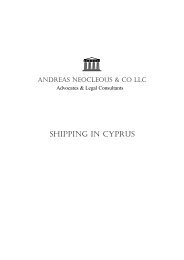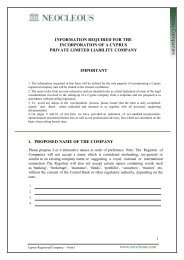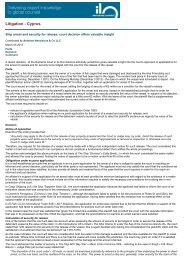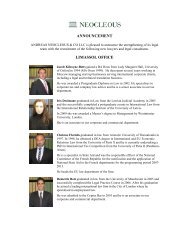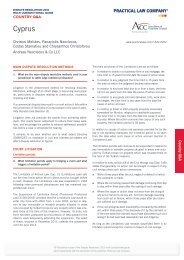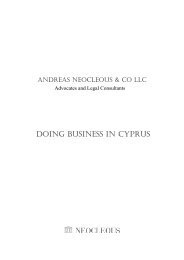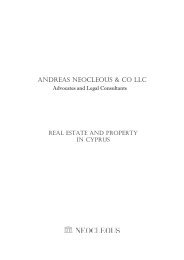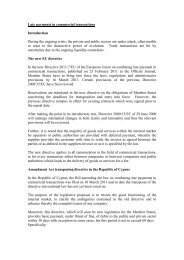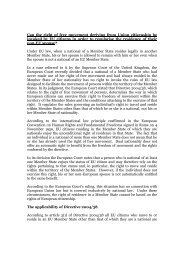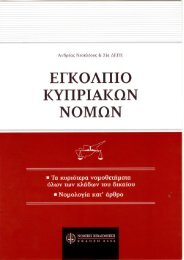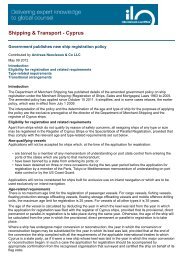Cyprus - Andreas Neocleous & Co
Cyprus - Andreas Neocleous & Co
Cyprus - Andreas Neocleous & Co
You also want an ePaper? Increase the reach of your titles
YUMPU automatically turns print PDFs into web optimized ePapers that Google loves.
CYPRUS<br />
CYP/39<br />
does not lose his right to reject the products since he did not have the chance to<br />
inspect them before they came to his possession.<br />
The Safety of <strong>Co</strong>nsumer Products Law of 1994, which came into force on 11<br />
January 1995, introduces and implements European standards for the safety of<br />
products. It provides that buyers must be informed of any dangers resulting from<br />
incorrect use of the products, outlines the legal responsibility of manufacturers,<br />
importers and suppliers for bodily harm or death of a consumer resulting from<br />
the use of their products, and provides for the banning or confiscation of<br />
products which do not meet safety standards. It gives extensive powers to the<br />
<strong>Co</strong>nsumer Protection Authority to conduct searches, and to confiscate or ban<br />
products.<br />
The Defective Products (Civil Liability) Law, Number 10(I)/95 ("the Defective<br />
Products Law"), which came into force on 1 January 1997, renders the producer<br />
or manufacturer of defective goods strictly liable for any damage caused by such<br />
products and brings <strong>Cyprus</strong> legislation in this area into line with European<br />
legislation. The law actually implements all European Directives on the area of<br />
product liability, including the 85/574/EEC Directive.<br />
Its main provisions are as follows:<br />
• Wherever a defect in a product causes personal injury or damage, the victim<br />
or his dependants may invoke the rules of strict liability to sue under the<br />
Defective Products Law. Liability is not limited to manufacturers alone. The<br />
Defective Products Law imposes liability under certain circumstances on the<br />
importers of products into the Republic of <strong>Cyprus</strong> and on the suppliers unless<br />
they comply with a request to name within a reasonable time the person<br />
supplying them with the product;<br />
• Defect is defined in section 4 of the Defective Products Law, which provides<br />
that there is a defect in a product if the safety of that product is not such as the<br />
consumer is entitled to expect. Of course, the circumstances under which the<br />
product is used, possessed, and consumed must always be taken into account.<br />
The burden of proving that there was a defect in the product and that the<br />
relevant injury or damage was wholly or partly caused by that defect lies on<br />
the plaintiff;<br />
• Section 12 of the Defective Products Law provides several defenses to strict<br />
liability. For example, the defendant will not be liable if he can show that the<br />
state of scientific and technical knowledge at the time was not such that a<br />
producer of products of the same description as the product in question might<br />
be expected to have discovered the defect if it had existed in his products<br />
while they were under his control (the development risks defense); and<br />
• Section 11 of the Defective Products Law provides that the action must be<br />
brought within three years of the date on which the plaintiff became aware or<br />
could reasonably have become aware of the damage or injury. Moreover, no<br />
action may be brought in any circumstances more than 10 years after the date<br />
on which the defendant supplied the relevant product to another.<br />
(Release 2 – 2013)




